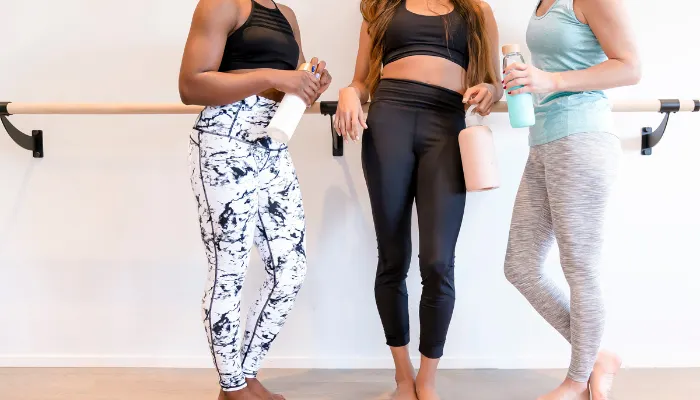Movement, Mindset, and Mom-Life: A Real Chat for Moms (Part 2)
Welcome to Part 2 of the 3-part series “Movement, Mindset, and Mom-Life: A Real Chat for Moms” with Juli McKee and Erika Friday.
For busy moms, self-care often feels like the last thing on the to-do list, especially with the constant demands of motherhood like little time and countless responsibilities. Whether you’re a new mom navigating sleepless nights (or sleep deprivation!) or a seasoned mom juggling a full-time job, it can be hard to find the time for your own needs.
Often, we put the needs of others before our own. But prioritizing your mental health and physical health is not a sign of weakness—it’s the best way to ensure you’re the best version of yourself for your family members and for YOU.
This post is all about mom self-care basics.

Mom Self-Care Basics
A small change to your daily routine, like incorporating deep breaths, a cup of tea, a break from social media to eliminate any mom guilt, or a gratitude journal, can have a big impact on your overall health.
The most important thing is recognizing that self-care isn’t just about big acts like date nights or hiring help; it's about incorporating small self-care practices and movement into your life in an enjoyable way, so you can better manage the challenges of motherhood.
Self-care tips, meeting your basic needs, and asking for help

Erika: So let's take this conversation into a pretty tactical place right now talking about mom's basic needs.
When we become mothers, many of us really emphasize the needs of our children, and we leave our own needs behind. This is an unintended consequence of the “attachment parenting style” and “attuned parenting” that was en vogue when I had my kids, 2015 and 2017. By being so responsive to our children, we let their needs overwhelm our needs, even down to sleep patterns.
So, if we think about the basic needs of sleep, nutrition, and movement, let's think about some real-life examples of the clients we've worked with and how we've helped them get these needs met as their life has just changed completely, becoming moms.
One of the things that my clients are surprised to hear me advise —
When it comes to my coaching clients, I am not in their life. I am someone who can give them observations and suggestions based on my expertise and approach. But they need to filter anything I say or anything they read or whatever they’re hearing on a podcast through the reality of their temperament, their values, and their circumstances.
So one of the first things if a mom is really struggling, say with her temper, with just feeling okay, with being sluggish, anything, the first thing I start with is are you getting enough sleep? And if we prioritized sleep over everything else, what would happen?
And that's a hard thing for some women to accept and try, because it almost feels passive. They want to be doing things and solving their problems actively, but if they're doing things from an empty tank, they're not going to get that far down the road.
Juli: Yes. I often say that sleep trumps exercise and people say, "Really?" Yes, actually, I want you to be able to move your body, but you need to have energy to do it, and you can't walk away from that workout exhausted for the rest of your day. It's going to be an unsustainable cycle.
So, sleep is a good base to start before you add on anything else really. I agree.

Erika: Another one is you might see some recipes for the best bowl and it has homemade dressing and grains and roasted veggies and greens and fresh veggies and beans and all these things. I want to eat that. I want to eat that every day.
But if you are running on low energy, limited time, and high demands, it may not be possible for you to make those 12 ingredients from scratch for the week.
So instead of having that as your goal, instead of a specific recipe for this bowl, reduce the goal to the most basic. In this example: I want to nourish myself, and I know the foods that help me feel that way. How can I get that into my life in a systematic way?
So, that might be shortcuts like buying the kale that's already washed and chopped at Trader Joe's. it might be figuring out the shortest shortcut dressing that combines the hummus and the good oils and all of these things and that took you literally a minute to make instead of the version that took extra super duper long.
So in my view, the goal that serves you isn't the object or the how. It's that greater thing of “I want to feel good about the food I'm eating, and then, let's be realistic about how to make it happen.”
Juli: That's a great example. I think food is a good example of this and how everything is so individual. If you take the time and do the process to do the fancy bowl does that aid in or take away from your fulfillment for the day and your energy for the day. The answer will be different for different people. Somebody might see that as stressful and time sucking, and somebody else might like to give themself the time to do this. Most people I think are in the first boat where they think, I want to eat this way, but I don't want to go through this crazy long process of doing it. So, yes, I think finding those shortcuts, they're not taking away from nutrition in your life by any means. Feeding yourself is the first priority, period. And going back to our other point, if you're deprived of sleep then everything is going to feel harder regardless.
Erika: Hot take: Admitting we have limitations is actually a power move. We are limited beings with limited resources. So if I can accept that, I can then look for solutions. So if I love to eat that bowl and I even like to make that bowl, but I have a really hard time doing that when my kids are around and they're always pulling on me and all of these things, what are my options? My levers are probably time and money. So, I could pay someone to watch my kids or I could pay someone to make my food. Or I could do a trade with a friend, "Hey girl, this week I will make lunches for both of us if you can watch my kids while I do it." There are lots of different creative ways to get our needs met, but when we are in it, it's really hard to see what those creative options might be.
Juli: I love thinking outside the box, using your support system. I hear a lot of this feeling like there is not that support or not wanting to ask for help.
Erika: Meeting your basic needs sometimes requires support, and asking for it. I’m excited to expand on this concept of “help,” because as a culture we shy away from asking for help. The word sounds like “Help, I'm drowning!” As if that's the only circumstance in which we would dare ask for help.
But what if we set it up more like a manager setting up a business or a team? You wouldn't wait for things to get dire before calling in resources. You would set it up in a way that's sustainable. And if I ask you for help in one way or another, I'm giving you the honor of helping me. And that feels good. And then we're more connected and we're in community. And it shows you an example of ways that you can ask for help, too.
A great way to incorporate self-care: movement in mom-life

Erika: What are all of the factors that make the motherhood phase — whether or not you carried a baby — different from any other phase that we've experienced before? And my question is mostly around the physical aspect of movement and getting that exercise in. What are all the factors that are different once you become a parent?
Juli: The biggest change is your time's not your own anymore. You lose a lot of autonomy over how you spend it.
Maybe if you’re lucky there’s a daycare situation at your gym and you can carve out a little solo time. Or you bring your kids along for outdoor play — but even then you’re still attending to them. You can't totally check into your own physical and mental needs when you’re keeping your eye on your toddler.
So you either need some kind of childcare, or you have to adjust your expectations for how, when, and where you move your body now.
Even once kids are school-aged, it’s still a juggle. You might have work during school hours, then after school you must consider, Do I go work out? But then who's making dinner? Am I missing out on family time?
At some point, you realize — this isn’t just exercise anymore. It’s self-care. You have to be willing to trade something to get that time for yourself.
You likely can't spend every Saturday paddle boarding at the lake on your own!
That's just not going to really happen unless there's a lot of other pieces falling into place.
Erika: I think that comes as a huge surprise. I think we probably take for granted that things do take time until we have these extra demands on our time. As my sister says, the time has to come from somewhere. Something's got to give.
The demands of motherhood can make it hard to care for your own needs, but small self-care activities—like getting enough sleep, spending quality time with your best friend, or enjoying a good meal can make a huge difference.
You can (and should!) find creative ways to integrate self-care rituals into your busy life. Whether it's movement you love, mindful meditation, getting enough sleep, conversing with a support network, enjoying nutritious meals, or taking a much-needed break to enjoy some fresh air, each small step will contribute to your overall emotional and physical health. Remember, taking care of yourself isn’t selfish; it’s necessary, and the health benefits are countless.
What will your self-care routine look like moving forward?
Stay tuned for Part 3 of the series: “Movement, Mindset, and Mom-Life: A Real Chat for Moms” !
This post was all about mom self-care basics. If this meant something to you, you might also like:
Movement, Mindset, and Mom-Life: A Real Chat For Moms (Part 1)
How to let go of perfectionism in motherhood
If this post helps make your mom-life easier,
subscribe to the weekly-ish newsletter and never miss a post.




